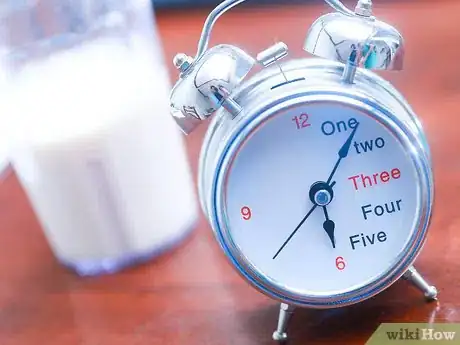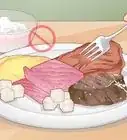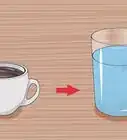This article was co-authored by Claudia Carberry, RD, MS. Claudia Carberry is a Registered Dietitian specializing in kidney transplants and counseling patients for weight loss at the University of Arkansas for Medical Sciences. She is a member of the Arkansas Academy of Nutrition and Dietetics. Claudia received her MS in Nutrition from the University of Tennessee Knoxville in 2010.
There are 9 references cited in this article, which can be found at the bottom of the page.
This article has been viewed 24,412 times.
Protein shakes are a simple way to prep muscle before a workout or help rebuild muscle post workout. Of course, one of the best ways to get the protein your body and muscles need is through solid food, but as you probably know, it's not always easy to get all of your protein through eating. This is especially true if you have a full-time job and don't always have the time to prepare full meals for the day. This is where protein shakes can be very useful.
Steps
Choosing a Protein Shake
-
1Consider your lifestyle and workout regime. Protein shakes aren't for everyone, but there are some reasons why the average athlete, as opposed to professional athletes or Olympians, would want to use protein supplements. The type of exercise you do will impact whether you need additional protein.[1] Determine whether any of the following apply to you:[2]
- Have you started a new exercise program or are you new to working out in general? If you're just hitting the gym for the first time and want to build muscle, your body will need more protein than you might otherwise.
- Are you intensifying your workouts? This applies to both cardio and weight training workouts. For example, if you usually do 30 minutes on the elliptical machine three times a week, but are now training for a marathon or a weightlifting competition, you're going to need more protein to facilitate muscle growth and strength.
- Are you recovering from an injury? People who've injured themselves generally need more protein to help their muscles and bodies heal and recover.
- Too much protein can be hard on your kidneys in the long term, and it could cause dehydration.[3]
-
2Determine how much total protein a day you need. Calculating how much protein you need is a key first step to deciding what, if any, additional protein your diet needs.[4]
- A big myth is that you need a ton of protein to achieve any of the above goals. Protein already accounts for about 15% of the daily caloric intake of most Americans. To build a single pound of muscle, you need about 10-14 additional grams of protein daily, which really isn't that much. Some protein powders have 80 grams of protein in a single serving! The average person doesn't need that much; instead your body just breaks it down for energy. Moreover, too much protein can actually cause harm to your internal organs, including the kidneys and liver.
- To figure out how much you're getting and whether you need additional protein, you need to do some math.
- Recreational athletes need about 0.5-0.75g of protein daily for every per pound of body weight.
- Competitive athletes need 0.6-0.9.
- Athletes building muscle mass need 0.7-0.9g.
- The max amount should not exceed more than 0.9 per pound of body weight.
- For example, if you are an adult athlete looking to put on muscle and you weigh 175 pounds, you need about 122.5-157.5 g (175 pounds x .7= 122.5 g to 175 pounds x .9= 157.5) of protein per day.
Advertisement -
3Determine how much of your average daily protein intake comes from solid food. Consider what you eat on an average day. You can consult with a dietitian or use online nutritional calculators that will tell you how much you're getting once you input the type and amount of food you are consuming.[5]
- For example, a 4oz hamburger has 30g of protein, 6oz of tuna has 40g, and 1oz of cheese has 7g. This means that just with these three foods you've ingested 77g of protein, which is nearly half of what you'd need if you weighed about 175 pounds and were looking to build muscle. Most adults probably don't need as much protein coming from shakes as they think they do!
- However, if you're not meeting the protein requirement you calculated with solid food throughout the day, then you should supplement your diet with a protein shake, either one you make with powder or a pre-made shake.
-
4Decide what kind of protein you want your shake to consist of. Protein shakes use different kinds of proteins and in different amounts. The most common sources of protein are whey, casein, egg, soy, rice, and milk.[6]
- Whey and casein are good choices, but only if you can tolerate dairy since both are milk products.
- Whey protein tends to be the most popular for shakes and is the fastest digesting protein.[7]
- If you prefer a plant-based protein, particularly if you are vegetarian or vegan, you may want to try soy protein. Soy is very rich in nutrients and has been shown to be as effective as most animal sources of protein.
-
5Read the label. Knowing exactly what is in your shake, and especially the amount of protein, is important if buying pre-made shakes, rather than powders. Protein shakes vary in content after all.[8]
- Make sure the product is more than 50% protein if your goal is to lose body fat.
- Make sure a single serving isn't way more protein than you actually need. Some powders have 80g of protein in them; if you only need to add an additional 40g to your daily protein intake, then that's not the best product for you.
- Look for shakes that provide all 20 amino acids; these are usually the highest quality products.
- Don't buy proteins that include growth hormones or steroids.[9]
- Remember that all supplements carry a risk of contamination.
Timing a Protein Shake
-
1Consider when you workout. This should be the determinant factor of when you decide to have a protein shake, since it's meant to supplement and enhance the physical training you are doing.
- When you consume protein and what you eat should be planned around your workout. For example, if you work out at 5am, a protein shake after the gym at 7am might double as breakfast for you.
-
2Drink a protein shake after a workout. Post-workout is one of the times that your body needs protein more than ever. This is the most effective time for drinking a protein shake in order to maximize its benefits for your body.
- Right after a workout, your body starts to heal and rebuild the muscle. This is important because of the "micro tears" in the muscle tissue, those very small tears caused by intense contraction of the muscles during exercise, such as weightlifting. Giving your body protein as soon as possible will make sure it has the fuel it needs to help the muscles heal, rebuild and grow.
- Protein shakes after a workout are better than solid food because the latter takes longer to digest and break down the protein and send it to the muscles. Protein shakes, on the other hand, only take approximately 30 minutes to reach the muscles after consumption.
- Have your shake within 45 minutes following a workout. During that time, your muscles are still fired up and your body is better able to absorb the protein and start rebuilding more quickly. The sooner you can have the shake after you finish working out, the better![10]
- You can also try drinking other liquids that contain protein after a workout, such as regular or chocolate milk.
-
3Consider consuming additional protein shakes. Although having a protein shake after a workout is the optimal time to have one, you can also consume them at different times of the day. You can also have more than one a day but be sure to consider how much protein you are already getting in a day and how much you need. Only have additional shakes if you NEED them to meet your protein requirement for the day. Remember not to overdo it on protein, which can harm your kidneys and your liver.[11]
- Drink a protein shake first thing in the morning. When you get up in the morning, your body has been inactive for 6-8 hours and is thus lacking nourishment, including protein. Without protein, the muscles in the body start to break down to create energy to keep your body going. Thus, having a protein shake as your breakfast can build muscle and energize the body, thus preventing muscle from breaking down.
- Drink a protein shake before a workout. Some people like to consume protein before exercise to promote muscle growth, strength, and keep muscles from breaking down over the course of the workout. A pre-workout shake is best consumed approximately 30 minutes before you begin your workout. This give the protein time to be digested and sent to the muscles.[12]
- Drink a protein shake before bed. Consider having a protein shake about one hour before you plan to go to bed. A shake with casein protein is a good choice. Casein works through your body a bit more slowly than whey, which is good when sleeping because that is when the amount of protein in your body starts to deplete. Effectively, you'll be nourishing the muscle while your growth hormones are elevated.[13]
-
4Make sure to consume protein throughout the day in addition to shakes. Protein shakes are especially good after workouts but to maximize their benefits, make sure that you are consistently consuming protein. Protein is key for achieving optimal progress in physique enhancement and performance Even if you aren't bodybuilding or trying to enhance your physique, protein is a key component to good nutrition.
- Try to get more protein through natural sources such as milk, eggs, meat and fish because they are unprocessed and have a higher nutritional value as a result. Shakes are a great way to get a large and immediate protein hit after working out, but they are also processed and don't have the same nutrients as protein-rich foods.
- After your post-workout shake, eat small meals containing high levels of protein at roughly 3-4 hour intervals. This will provide your muscles with a steady supply of protein and hasten the healing process.
- Eat a breakfast with protein. Breakfast in the morning is key since your body needs nourishment after 7-9 hours of rest.
Expert Q&A
-
QuestionAre protein shakes good for weight loss?
 Claudia Carberry, RD, MSClaudia Carberry is a Registered Dietitian specializing in kidney transplants and counseling patients for weight loss at the University of Arkansas for Medical Sciences. She is a member of the Arkansas Academy of Nutrition and Dietetics. Claudia received her MS in Nutrition from the University of Tennessee Knoxville in 2010.
Claudia Carberry, RD, MSClaudia Carberry is a Registered Dietitian specializing in kidney transplants and counseling patients for weight loss at the University of Arkansas for Medical Sciences. She is a member of the Arkansas Academy of Nutrition and Dietetics. Claudia received her MS in Nutrition from the University of Tennessee Knoxville in 2010.
Master's Degree, Nutrition, University of Tennessee Knoxville Master's Degree, Nutrition, University of Tennessee KnoxvilleExpert AnswerIf you use your protein shake as a meal replacement, then it may help with weight loss. If you are trying to lose weight, do not drink a shake in addition to eating your meal.
Master's Degree, Nutrition, University of Tennessee KnoxvilleExpert AnswerIf you use your protein shake as a meal replacement, then it may help with weight loss. If you are trying to lose weight, do not drink a shake in addition to eating your meal. -
QuestionHow do protein shakes work?
 Claudia Carberry, RD, MSClaudia Carberry is a Registered Dietitian specializing in kidney transplants and counseling patients for weight loss at the University of Arkansas for Medical Sciences. She is a member of the Arkansas Academy of Nutrition and Dietetics. Claudia received her MS in Nutrition from the University of Tennessee Knoxville in 2010.
Claudia Carberry, RD, MSClaudia Carberry is a Registered Dietitian specializing in kidney transplants and counseling patients for weight loss at the University of Arkansas for Medical Sciences. She is a member of the Arkansas Academy of Nutrition and Dietetics. Claudia received her MS in Nutrition from the University of Tennessee Knoxville in 2010.
Master's Degree, Nutrition, University of Tennessee Knoxville Master's Degree, Nutrition, University of Tennessee KnoxvilleExpert AnswerProtein shakes work the same as eating protein from whole foods such as meat or eggs. Your body will break it down into amino acids to help rebuild muscle.
Master's Degree, Nutrition, University of Tennessee KnoxvilleExpert AnswerProtein shakes work the same as eating protein from whole foods such as meat or eggs. Your body will break it down into amino acids to help rebuild muscle. -
QuestionHow do you use whey protein?
 Claudia Carberry, RD, MSClaudia Carberry is a Registered Dietitian specializing in kidney transplants and counseling patients for weight loss at the University of Arkansas for Medical Sciences. She is a member of the Arkansas Academy of Nutrition and Dietetics. Claudia received her MS in Nutrition from the University of Tennessee Knoxville in 2010.
Claudia Carberry, RD, MSClaudia Carberry is a Registered Dietitian specializing in kidney transplants and counseling patients for weight loss at the University of Arkansas for Medical Sciences. She is a member of the Arkansas Academy of Nutrition and Dietetics. Claudia received her MS in Nutrition from the University of Tennessee Knoxville in 2010.
Master's Degree, Nutrition, University of Tennessee Knoxville Master's Degree, Nutrition, University of Tennessee KnoxvilleExpert AnswerWhey protein can be purchased as a powder that you can mix with other ingredients such as frozen fruit, peanut butter, or yogurt. Or, you can buy prepared shakes that already have the water and other ingredients added.
Master's Degree, Nutrition, University of Tennessee KnoxvilleExpert AnswerWhey protein can be purchased as a powder that you can mix with other ingredients such as frozen fruit, peanut butter, or yogurt. Or, you can buy prepared shakes that already have the water and other ingredients added.
Warnings
- Talk to your doctor about using protein shakes.⧼thumbs_response⧽
- Supplements are not regulated by the FDA for content, claims, or labeling. Check for a third party verifier, such as USP.⧼thumbs_response⧽
- Protein shakes should not be used by people with kidney or liver disease.⧼thumbs_response⧽
- Excessive intake of protein can contribute to kidney and liver damage.⧼thumbs_response⧽
- Excess protein is converted to energy and stored as fat if not used.⧼thumbs_response⧽
- Without an adequate amount of protein, our muscles aren't able to heal as quickly. This could lead to overtraining your muscles, which in turn can lead to injury. Be sure to make a concerted effort to get plenty of protein if you're doing a lot of weight lifting.⧼thumbs_response⧽
- If you are taking in a lot of protein, ask your doctor about supplementing your diet with calcium and magnesium, since excessive amounts of protein your system can cause depletion in your body's store of calcium and magnesium.⧼thumbs_response⧽
References
- ↑ https://www.health.harvard.edu/blog/the-scoop-on-protein-powder-2020030918986
- ↑ https://medlineplus.gov/ency/article/002458.htm
- ↑ http://www.eatright.org/resource/fitness/sports-and-performance/fueling-your-workout/how-teen-athletes-can-build-muscles-with-protein
- ↑ https://www.sclhealth.org/blog/2019/07/how-much-protein-is-simply-too-much/
- ↑ https://www.hsph.harvard.edu/nutritionsource/what-should-you-eat/protein/
- ↑ https://foodinsight.org/a-primer-on-protein-powders/
- ↑ http://www.menshealth.co.uk/food-nutrition/muscle-foods/a-beginners-guide-to-protein-shakes-344902
- ↑ http://www.webmd.com/diet/protein-shakes
- ↑ http://www.eatright.org/resource/fitness/sports-and-performance/fueling-your-workout/how-teen-athletes-can-build-muscles-with-protein
- ↑ http://www.menshealth.co.uk/food-nutrition/muscle-foods/a-beginners-guide-to-protein-shakes-344902
- ↑ https://www.webmd.com/vitamins-and-supplements/features/protein-powder#2
- ↑ http://www.menshealth.co.uk/food-nutrition/muscle-foods/a-beginners-guide-to-protein-shakes-344902
- ↑ http://www.menshealth.co.uk/food-nutrition/muscle-foods/a-beginners-guide-to-protein-shakes-344902
About This Article
To use protein shakes, start by calculating how much protein you need daily based on your activity level and weight. Next, figure out how much protein you get from solid food each day so that you don't ingest too much protein when adding shakes to your diet. Then, choose between dairy-based protein shakes made with whey or casein or plant-based soy shakes. The best times to drink protein shakes are first thing in the morning and about 45 minutes after working out. To learn about other beneficial times to drink a protein shake, read on!




































































Medical Disclaimer
The content of this article is not intended to be a substitute for professional medical advice, examination, diagnosis, or treatment. You should always contact your doctor or other qualified healthcare professional before starting, changing, or stopping any kind of health treatment.
Read More...